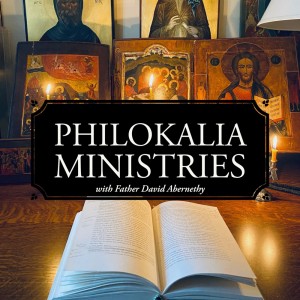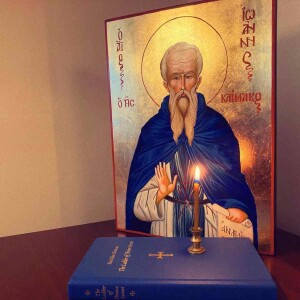We began this evening with Step 3 “On Exile.”The connotation of the word, as we discussed, can lead one to think of punishment or being removed from the things that are needed or loved. However, as we make our way through the step we begin to see that exile is a path to freedom. It is a gradual turning away or separating oneself from the world in order that one might become inseparable from God. At the heart of exile is a deep desire for God; the longing of the heart that leads one to run toward Him as the source of life. The more we begin to see this truth the clearer it becomes to us that we cling to things with a sense of needing them for meaning or purpose. Exile is so important because it removes that illusion. It shows us that so many things that we have had in our lives hold no lasting promise within them. God is to be the beginning and end of all things for us; and exile gives birth to the kind of detachment that allows us to be ever so confident in what He alone can provide.
---
Text of chat during the group:
More Episodes
Saint Charbel Novena, Day Five
 2024-11-14
2024-11-14
 221
221
Saint Charbel Novena, Day Four
 2024-11-14
2024-11-14
 182
182
Saint Charbel Novena, Day Three
 2024-11-14
2024-11-14
 204
204
The Ladder of Divine Ascent - Chapter XXX, Part III
 2024-11-13
2024-11-13
 308
308
Saint Charbel Novena, Day Two
 2024-11-12
2024-11-12
 296
296
Saint Charbel Novena, Day One
 2024-11-12
2024-11-12
 301
301
The Evergetinos: Book Two - Hypothesis XXIV, Part II & XXV, Part I
 2024-11-11
2024-11-11
 340
340
The Ladder of Divine Ascent - Chapter XXX, Part II
 2024-11-06
2024-11-06
 441
441
The Evergetinos: Book Two - Hypothesis XXIII, Part II and XXIV, Part I
 2024-11-04
2024-11-04
 416
416
The Ladder of Divine Ascent - Chapter XXIX, and XXX, Part I
 2024-10-30
2024-10-30
 500
500
The Evergetinos: Book Two - Hypothesis XXIII, Part I
 2024-10-28
2024-10-28
 404
404
The Ladder of Divine Ascent - Chapter XXIX, Part I
 2024-10-23
2024-10-23
 471
471
The Evergetinos: Book Two - Hypothesis XXII, Part III
 2024-10-23
2024-10-23
 391
391
The Ladder of Divine Ascent - Chapter XXVIII, Part VII
 2024-10-16
2024-10-16
 501
501
The Evergetinos: Book Two - Hypothesis XXII, Part II
 2024-09-23
2024-09-23
 651
651
The Ladder of Divine Ascent - Chapter XXVIII, Part VI
 2024-09-18
2024-09-18
 601
601
The Evergetinos: Book Two - Hypothesis XXI, and XXII, Part I
 2024-09-16
2024-09-16
 489
489
The Ladder of Divine Ascent - Chapter XXVIII, Part V
 2024-09-11
2024-09-11
 567
567
The Evergetinos: Book Two - Hypothesis XIX, and XX
 2024-09-10
2024-09-10
 475
475
The Ladder of Divine Ascent - Chapter XXVIII, Part IV
 2024-08-28
2024-08-28
 658
658
Create your
podcast in
minutes
- Full-featured podcast site
- Unlimited storage and bandwidth
- Comprehensive podcast stats
- Distribute to Apple Podcasts, Spotify, and more
- Make money with your podcast
It is Free
You may also like

Straight TV


The Tangent on Veritas Catholic Network


Life After Ministry


Forbidden Knowledge News


Astrology of the Week Ahead with Chani Nicholas

- Privacy Policy
- Cookie Policy
- Terms of Use
- Consent Preferences
- Copyright © 2015-2024 Podbean.com




 iOS
iOS Android
Android